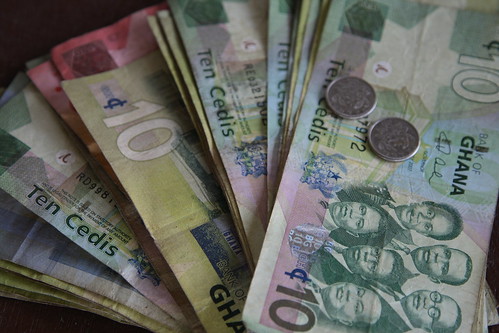
In Ghana, election year comes with many activities. Except for the political events, speeches and rallys, the economy sees many hikes and lows. What is happening is that projects in the pipeline suddenly need to be executed as a 4 year period comes to an end. On one hand, this is great news, new roads are finally completed, there is work for everyone and business is flourishing. The downside of this increase in expenditure is heightened inflation and a weakened cedi exchange rate.
In April, Ghana’s inflation was at a year high at 9,1 percent (up from 8,8 percent the month before), reports AF Reuters. This morning on BBC, a report describing Argentina’s financial situation seemed to echo what is happening in Ghana. Hotel rooms, school fees, real estate is all quoted in US dollars as the value of the local currecy shifts so often (downwards) that it is no point setting prices in it. The exchange rate influences the inflation rate. Bank of Ghana in their Inflation Outlook Report (April 2012) states:
The cedi weakened against the US dollar as a result of high demand for foreign exchange. In the first quarter of
2012, the cedi depreciated by 8.3 per cent against the US dollar, compared to 2 per cent depreciation in the
same period of 2011.
The weakening of the local currency started in the last quarter of 2011 and was driven by several factors
including the growing demand for foreign exchange to support increased economic activity due to the expansion
of the economy. A second, more structural factor is the changing nature of the trade pattern which is graduallyshifting towards Asia, especially China, for which transactions are mostly conducted on cash basis. The
persistent depreciation of the cedi can have far reaching consequences on the inflation profile. A third factor
relates to external sector conditions, such as the euro zone crisis which have also instigated investor portfolio
outflows from the bond market in the latter part of 2011. There are also the speculative activities by foreign
exchange traders trying to profit from the depreciation of the currency while other market participants seek to
hedge against further depreciation thereby exacerbating the situation.
In January, the exchange rate was 1.65 GHC to 1 USD. In April, I bought flight tickets for my family’s yearly trip to Sweden to the exchange rate of 1,78 GHC to 1 USD. Yesterday, the exchange rate announced on the evening news was 1,93! As imports are dominating the Ghanaian market, that is we do not produce many goods locally, this affects not just foreign travel, but almost every purchase in your daily life.
The effect on Ghanaians’ lives is immediately felt, as each week your salary can buy you less. Some goods such as cement is because of increased demand rising even quicker in price. A bag of cement that was 16 GHC in February is now 20-23 GHC! Just like in Argentina, there has been recent debate on if official numbers really capture the inflation “on the ground”. Dr Bawumia from the opposition has raised issues, the Ghana Statistical Survey has responded. Regardless, this is a problem that Ghanaians carry into the upcoming election 2012.
Read more in AF Reuter’s report, on Bank of Ghana’s website and Ghana Statistical Service. Photo from Flickr.


